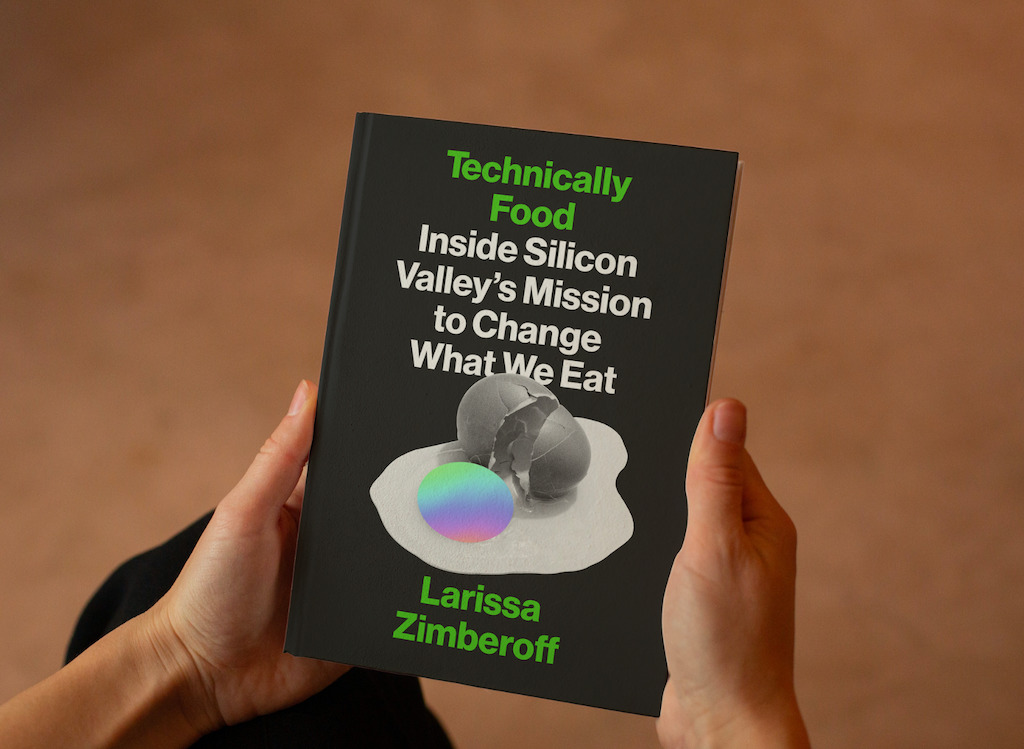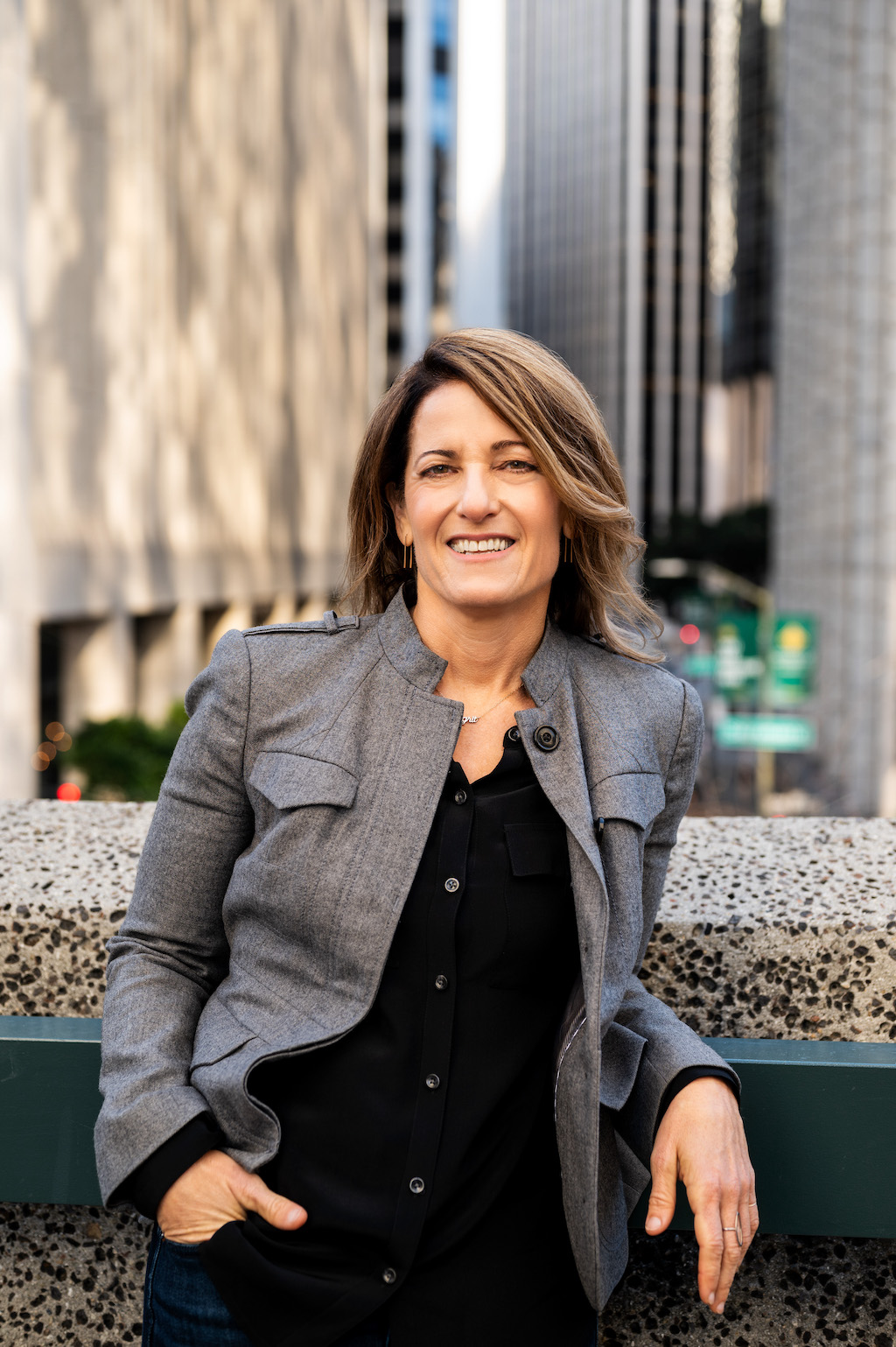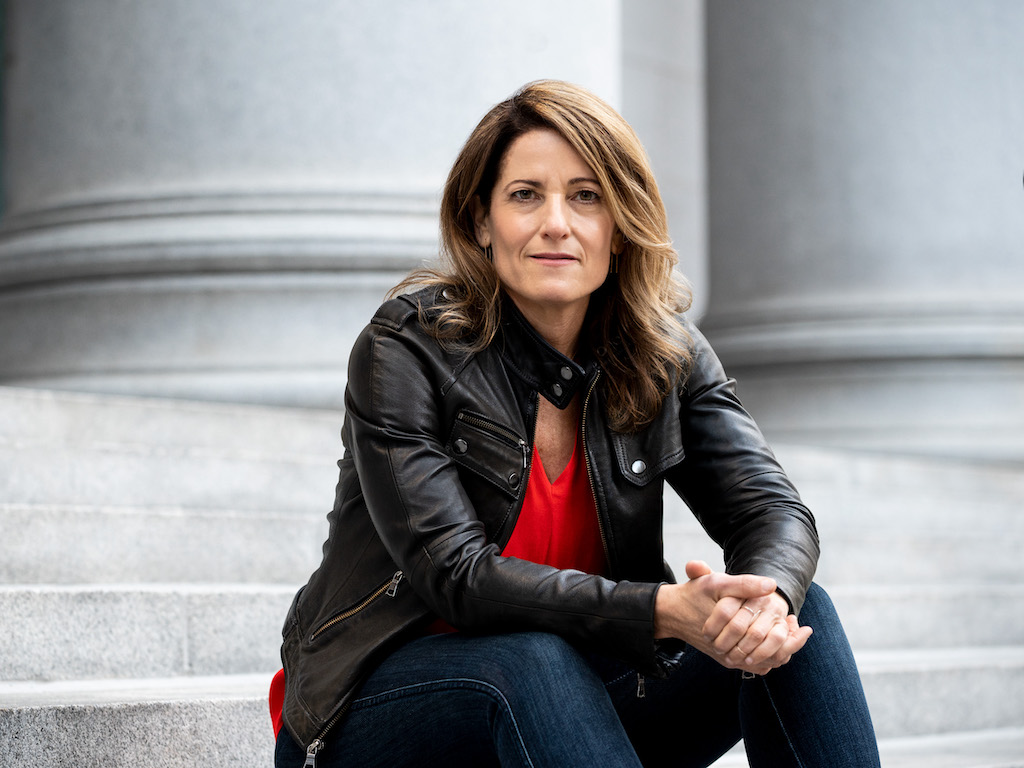Veteran Journalist Larissa Zimberoff: ‘Investors Want to Know That Food Companies Have Technology, That’s Why They’re Investing’
13 Mins Read
Investigative journalist Larissa Zimberoff has spent years covering the business of food and its intersection with technology for publications like The New York Times, Bloomberg Businessweek and The Wall Street Journal. In her new book Technically Food: Inside Silicon Valley’s Mission to Change What We Eat, published this past June, she explores billion-dollar-backed novel food technologies such as cellular agriculture and precision fermentation and the growing food tech industry. Green Queen editor-in-chief Sonalie Figueiras sat down to talk to Zimberoff about the book, all things alt protein, how Type 1 diabetes shaped her career and why she believes we are in danger of losing our grasp on how food is made. Below, the full interview.
Transcription by Sally Ho.
GQ: It’s great to have you here to share more about your new book Technically Food. My first question is really about why you felt it was so important to write this book. Can you tell us a bit about that?
LZ: Yeah, definitely this book has become a bit of my cause. And it’s for two reasons. One is because everybody I know, and people I didn’t know strangers at parties, friends, family would ask me about these foods. They would ask me if they were good for them, if they were tasty, if they were delicious, if they were good for the planet. Or how they were on their sustainability metrics, like everyone had a question. And I realised that this was, you know, that food was changing. It was changing so rapidly that people weren’t keeping up. So that was one reason that I realised that it was time to write this book.
Then the other reason is that my background kind of told me that I was the right person to write this book, which is that I have type one diabetes. I was diagnosed with it at 12 years old and I wasn’t that great when I was initially diagnosed. But over time, I have come to really look at my food in a different way. In my book, I say that I see through food, or maybe I have something like an X-ray vision. I look at food for its building blocks, carbohydrates, proteins, fats, fibre. I look for how it’s going to affect me when I eat a meal, and later how it will affect my blood sugar, anything that involves my diabetes management, like the day to day of just having this condition that I have to live with.
So these two things–using the lens of diabetes and then food tech—the excitement around food tech, the investment in the food tech, or frenzy of food tech—and people just not understanding what was happening. I felt these were the two reasons that I needed to write this book.

GQ: The book’s title is Technically Food, and we’re talking about food tech. You’ve spoken to dozens of companies and founders and looked at all the technologies in the works that are already commercially available. How much of this is still food versus how much of it being technology?
LZ: That’s a great question. You know, technology has been in our food system for a long time for decades, since our food became industrialised in the post-war period and into the 1970s. So food scientists and technology, that’s not new. But in the ways that people and technology companies are creating wholly new foods, ways that we’ve never heard of.
You know, I asked Perfect Day about their casein and whey proteins that they’re creating. Because it made sense to me that this would have been done already in a lab, like at Carnation or at Nestlé. But his answer to me was that they might have come up with it, but no one would have seen a reason to do it, because they had the supply chain and agricultural system set up to do it cheaply. Now, because the climate is becoming this like thing—people are talking about the climate, and companies are making it their mission base. There’s a reason to come up with a way to do these things.
The big question is and will be: can they scale? Because right now, it’s still in these micro mass amounts that haven’t gotten far. But we’ve had technology in our food system, it’s just that there wasn’t a reason to kind of remake everything that we know into something different.
GQ: Just to follow up on that, there are a few who feel that the more technology is involved in our food, the more worrying it is, or maybe even dangerous. How do you square that kind of viewpoint?
LZ: I think I wanted to write my book because I didn’t want people to lose a grasp of how food was being made—and I think we are in danger of losing that grasp. I think that we might be able to look at milk this way. You and I know that milk came from cows and squeezed from their udders. But today, kids from the Gen Z and Alpha generation, they may only see milk coming in a Tetra Pak. They may not even know that it came from a cow at some point. So I think that it is important to know how your food is made, because you’re ingesting it. The number one thing you can do to be healthy is watch what you eat. I think we owe it to ourselves to watch over what we eat. And, perhaps it’s because I have diabetes, which means I want people to have higher expectations. I want people to work harder for what they eat. I know that that is probably unreasonable but what you put in your body is important.
GQ: Certainly. You mentioned Gen Zs and after that, the Alpha generation. How important of a role do you think they are playing in this kind of new food revolution that’s happening? If they’re really the no meat, no alcohol, no car generation, it’s going to have a huge impact on our food system, right?
LZ: I don’t think they’re influential yet. But they are going to create the change. I have this sceptical criticism of things like cultured meat. If nutritionists and doctors are telling us to eat less meat, I’m confused—it’s like why? Why are we spending so much money to make meat? I know they’re making meat to give to meat-eaters. But I’m just okay with it, and I’m tasting it here and there and probably for a couple of times a year, but it’s not going to be something I’d buy at the market instead of tempeh or tofu. But flash forward to Gen Z and Alphas, they’re going to get us there, right? So the next generations are going to shift our diet in ways that we may or may not know right now.
GQ: There’s this tension that exists between two imagined futures in America. One that is more tech-enabled, where we take animals out of the equation and lower the emissions of food produced and give people alternatives. That’s everything from plant-based to precision fermentation and cell-based tech. Then there’s a more activist farmer-led conversation about food being local, equitable, organic and sustainable or regenerative agriculture. Do you see a potential where these two co-exist or to become one?
LZ: You know, my hope is that we can get these camps to work together. Then, we also have other groups that we’re not even thinking about. For example, I want investor money to go to regenerative organic. I want investor money to go to making soil sexy, you know? We were able to do that with food waste, right? We finally made food waste an issue that people cared about. I want investment to go to local vertical farms, or urban centres where communities are trained to work and get food. I want money to be in more places than it is now.
And I do think it’s important. I’ve been to New Harvest conferences where they have something like a veterinarian from a farm on a panel with DuPunt. And I recently connected a lamb farmer with a cultured meat maker. If we can keep having those conversations, if we can put money in more places and more pots, and if we can get more people talking, then I think that we can have a better system. That’s my hope. That’s what I believe. If we can be more equitable with money, and with who’s making our decisions right now, which right now, is made by just a few. I worry that if we go on this current trajectory, our food decisions will continue to be made by the few.
GQ: Is the idea that we need a broader array of voices in the conversation?
LZ: Yes and no. A broader view that there are more solutions. It isn’t just cultured meat, it isn’t just casein in a non-animal produced way. It’s more than that, right? All of these activists and vegan founders are saying: okay, no one’s going to listen to us and stop eating animal products, so we’re going to replace your animal products with these lab meat products or processed versions made in a manufacturing facility. I think that there are more solutions than that. I think that they’re siloed in their thoughts and I want to see them horizontally thinking about the food system, not vertically.
The other thing worth mentioning is how the food conversation in the United States tends to be dominated by the white voice. You see these movements happening now that have been amplified during the pandemic, of Black activists who are demanding their space, their place at the table, and calling for their own vision of what a food system looks like for them and their communities, which is important to hear.
GQ: What are some of the technologies in the book that kind of blew your mind the most?
LZ: I write in my algae chapter that I’m a believer. I really want algae to find a way into our food system, in more ways than macroalgae like seaweed and kelp. I really want microalgae to be figured out because we’ve been trying for so long. Seeing Plantible Foods growing lemna, which is this tiny duckweed, and processing it into a protein called RuBisCO. It’s found in all leafy greens, but you want it to be worth your while, so no one is taking apart spinach or kale to get it. It’s got to be coming from something worthless right now in the food system—and duckweed is totally worthless in the food system. It’s like the perfect solution and it grows rapidly. So if they can figure out how to get the protein, how to make foods out of it, make it tasty without a lot of post-processing, that’s really exciting to me, the potential of that.

It’s funny because you know, Pat Brown says that RuBisCO is what he wanted to use, right? But no one could because no one could scale it, right? So it would be great if someone could get there and sort of prove and show them a little. I’d love that.
I’m also really excited about the mycoprotein trend and where that’s going. Because that’s something that seems like a protein that I can get behind, that I can be interested in consuming, that doesn’t need a lot of tinkering. It has a lot of promise. So that also sort of blew me away.
GQ: I noticed you didn’t spend a lot of time in your book on insects. Why is that?
LZ: I discussed having an insect chapter. I was so into crickets and how they were being brewed into like a protein bar. I was so interested in that. I was talking to weird nerdy bug growers around the country and I really wanted to believe in it. I kept pitching stories to publications, and I’d either get there before they were ready for it or after they’d done something. I just never landed a piece, even though I’d done so much research. So I was seeing that it was just not gaining traction. It wasn’t going to get beyond being formulated into a couple of energy bars.
So I made the executive decision for myself and my book not to include a chapter on bugs because I was really clear with what was in the book, which is food for humans. Not food for fish and not food for animals, but food for humans. I also struggle with the idea that people are even going to want to eat insects. We’re already having trouble with people wanting to eat, you know, molecularly identical dairy or alternative meats. And those are foods we recognise. So now we’re saying, everyone eats crickets? It still needs so much of ‘hiding the origins’, so I didn’t see how it could get onto our dinner plates.
GQ: What’s your view on precision fermentation? I mean, because that feels less high on the tech spectrum compared to cellular agriculture. It feels like it could really be a game changer happening at scale. It’s programming microbes with DNA. Why not?
LZ: I think I’m interested in it. But I also think there’s this business term aspect to it. Like an investor term aspect to it. That concerns me, because it’s like: let’s give it a fancy term, kind of like how they were pushing for the term “clean meat”. When everyone was sort of jockeying for new words for cellular agriculture or lab-grown, and now everyone has kind of landed on cultured meat. But I feel like precision fermentation to me, is very much an image thing. It’s very much a word for investors, because investors want to know that their companies have technology and that’s why they’re investing. So, yes, I’m interested in how, you know, yeasts and bacteria can be programmed to make something. I mean, I have diabetes. So my insulin is made this way, and rennet is made this way so it can be vegetarian. That’s why I am very interested in it, because I think it can replace some things that are not great. I am looking forward to the day that precision fermentation is used for something different, for something out of the box that we’re just not thinking about yet.
GQ: That’s a really interesting perspective. You close the book with some predictions. What are some of them?
LZ: I want to give a plug real quick for that. Because what I loved about that section was that you really got everyone’s hopes and dreams for where our food system might go. And in terms of predictions, they are definitely more nuanced than I’m suggesting. There were so many people that I wanted to be in it. It was like: you would have been great to include, and I’m sorry I can’t include you. But yeah, I want better vegetables, I want vegetables that grow in the ground. I want better crops. And I want technology to be making those things for us. I want the technology that I talked about in my book to come up with ways to make the foods we know, and the foods that are healthy for us—whole foods. I want them to work on those to make them better, to make them what they once were. And I want new protein options. Give me something other than tofu and tempeh. Give me the mycoprotein slab, or you know, something new. We all like variety and we all like new things, so I still want to be pushed and prodded into thinking about food and what else that can be.
GQ: Final question. You mentioned tasty things, and one thing about your book that struck me was that you really enjoyed the mycelium. Could you share more?
LZ: Yeah, I did. I had the “jerky” and “chicken” and it had really great fibre. I had “steak” and it had a wonderful texture and tug and heft to it. The flavour might have needed a little work, but recently, I went to The Better Meat Co. in Sacramento. I got to try out Paul Shapiro’s mycoprotein, Rhiza, and I got to try it with the chefs who made it right there. It was good. Maybe a little too pink-looking. So there’s also appearance—we haven’t even touched on the appearance of food and what our eyes need to bring in or the delight of food we get from just seeing it. But we took some of his mycoprotein to a steakhouse and they grilled it up on the grill, the same grill that touches all the steaks, and then they sliced it up real thin against the grain and put a chimichurri sauce on it. And it was so good. We all stood around eating from a shared plate. It was delicious. It was like it had a little fibre. It has more carbs than I want a protein to have, but it has carbs and it has protein. It’s just made in a vat, squeezed together and then kind of cured or dried in some fashion. Then that was basically it. So it is an exciting protein with potential.
Technically Food: Inside Silicon Valley’s Mission to Change What We Eat by Larissa Zimberoff (Abrams Press; $27) is available online and at all major bookstores.
Lead image courtesy of Larissa Zimberoff.




